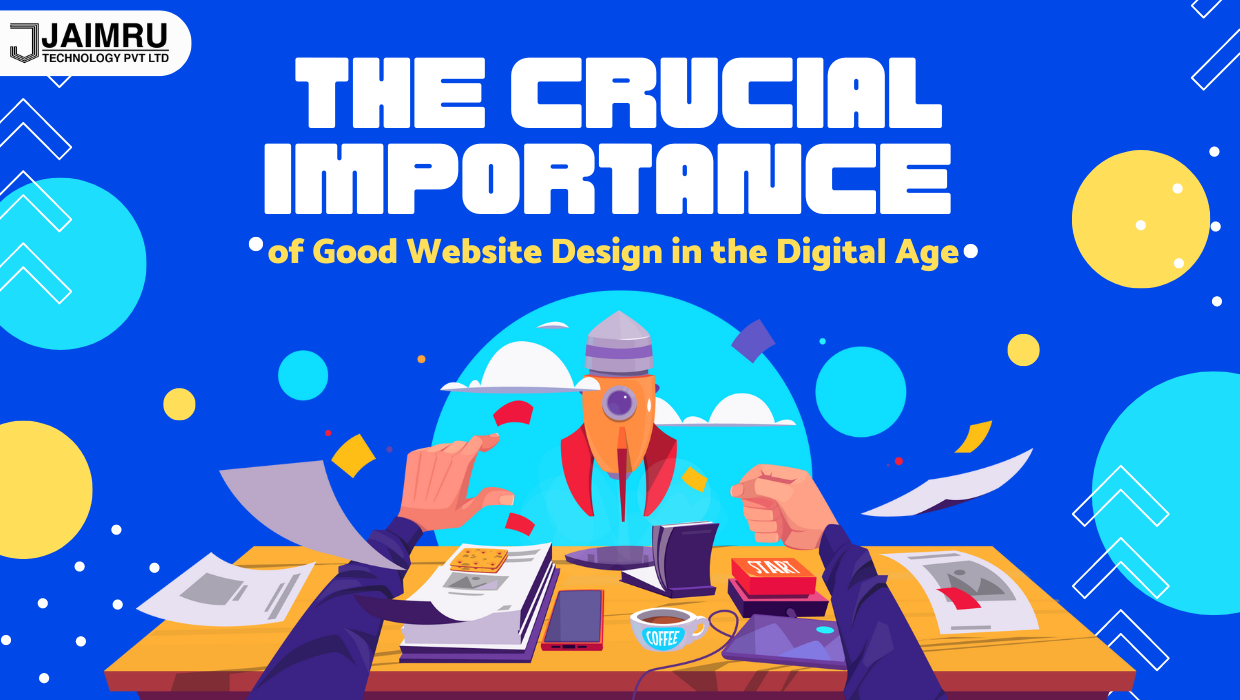
Posted On : 24-06-2024 10:56:00
In the digital landscape of today, where the internet serves as the primary gateway for businesses to connect with their audience, the significance of good website design cannot be overstated. A website is often the first point of contact between a company and its potential customers.
In a fraction of a second, visitors form opinions about a website based on its design, and these opinions can profoundly impact their decision to engage further or seek alternatives. Therefore, investing in a well-thought-out and professionally executed website design is not just a luxury but a strategic necessity for businesses aiming to thrive in the competitive online realm.
One of the foremost reasons why good Website Design is indispensable lies in its ability to establish credibility and trust. A professionally designed website conveys a sense of legitimacy and competence, reassuring visitors that they are dealing with a reputable entity.
Elements such as clean layout, intuitive navigation, and visually appealing aesthetics contribute to creating a positive first impression, fostering trust in the brand and its offerings. Conversely, a poorly designed website can raise doubts about the credibility of the business, leading potential customers to look elsewhere for their needs.
User experience (UX) plays a pivotal role in determining the success or failure of a website. A well-designed website prioritizes the needs and preferences of its users, ensuring that they can navigate seamlessly through the site and find the information or products they seek with ease.
Intuitive navigation, clear calls to action, fast loading times, and mobile responsiveness are key factors that contribute to a positive UX. By focusing on these aspects, businesses can enhance engagement, reduce bounce rates, and increase the likelihood of conversions, ultimately driving growth and profitability.
In today's crowded digital marketplace, simply having a website is not enough; it must also be optimized for visibility and accessibility. Good website design incorporates search engine optimization (SEO) best practices to improve its ranking in search engine results pages (SERPs), making it easier for potential customers to discover the site.
Additionally, accessibility features such as alt tags for images, descriptive link text, and compatibility with assistive technologies ensure that the website can be accessed and enjoyed by users of all abilities, including those with disabilities. By maximizing visibility and accessibility, businesses can broaden their reach and attract a diverse audience, driving traffic and conversions.
In a competitive market landscape, standing out from the crowd is essential for success. Good website design offers businesses a valuable opportunity to differentiate themselves from competitors and carve out a unique identity in the minds of consumers. By infusing their website with elements that reflect their brand personality, values, and unique selling propositions (USPs), businesses can create a distinctive online presence that resonates with their target audience.
Whether through innovative design elements, compelling storytelling, or interactive features, a well-executed website design can help businesses leave a lasting impression and gain a competitive edge in the market.
Consistency is key to building a strong and memorable brand identity. A well-designed website serves as a digital storefront for a business, providing a platform to showcase its brand image, messaging, and values to the world. By maintaining consistency in design elements such as colors, fonts, imagery, and tone of voice across all digital touch points, businesses can reinforce their brand identity and strengthen brand recognition. This cohesive brand experience fosters trust and loyalty among customers, encouraging repeat business and advocacy.
Moreover, a consistent brand presence instills confidence in consumers, signaling that the business is reliable and committed to delivering a superior experience at every interaction.
Consumer preferences and behaviors are constantly evolving in response to technological advancements and cultural shifts. Good website design enables businesses to stay agile and responsive to these changes, ensuring that their online presence remains relevant and engaging to their target audience.
Whether it's implementing responsive design to accommodate mobile users, integrating social media features to facilitate seamless sharing, or incorporating interactive elements to enhance engagement, a well-designed website can adapt to evolving consumer preferences and deliver a superior user experience across different devices and platforms.
Ultimately, the primary objective of any business website is to drive conversions and generate revenue. Good Website Design plays a pivotal role in achieving this goal by optimizing the user journey and removing barriers to conversion.
Whether it's making the checkout process intuitive and frictionless, highlighting key product benefits and features, or leveraging persuasive design elements such as compelling calls to action and social proof, a well-designed website can guide visitors seamlessly through the sales funnel and encourage them to take the desired action. By maximizing conversions and revenue, a good website design delivers tangible returns on investment (ROI) and contributes to the overall success of the business.
Good website design is not just a nicety but a strategic imperative for businesses operating in the digital age. From establishing credibility and trust to enhancing user experience, maximizing visibility and accessibility, differentiating from competitors, facilitating brand consistency, adapting to evolving consumer preferences, and driving conversions and revenue, the importance of good website design permeates every aspect of online business success.
By investing in a well-thought-out and professionally executed website design, businesses can create a compelling online presence that captivates their audience, fosters trust and loyalty, and drives sustainable growth in the dynamic and competitive digital marketplace.
Copyright 20-2025 Jaimru Technology Private Limited | All Rights Reserved.